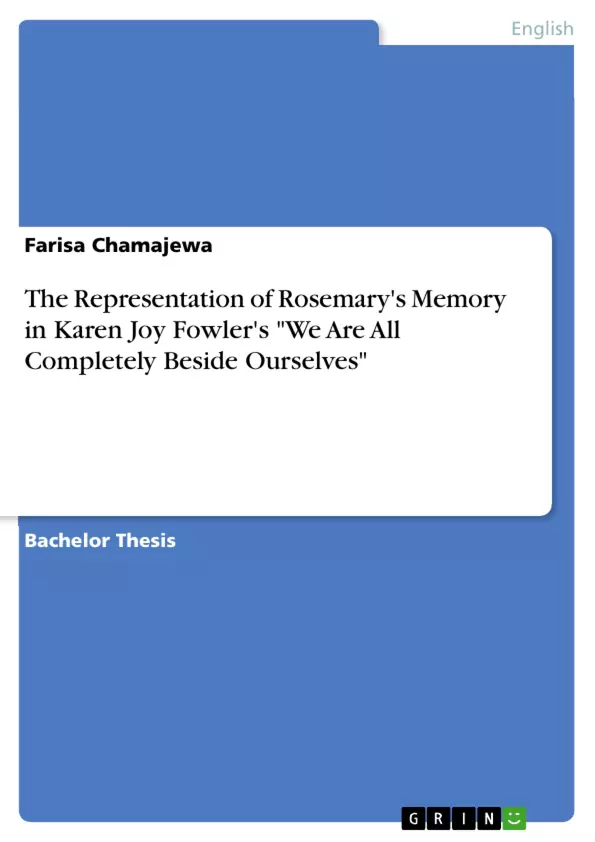The aim of this thesis is to examine the manipulation of memory by Rosemary Cooke in Karen Joy Fowler’s novel "We Are All Completely Beside Ourselves". To this end, different aspects which are linked to the representation of memory will be looked at.
The first aspect is the construction of memory. This is crucial to distinguish between the non-linear narrative and the actual timeline. Essential questions are: What is the timeline of the story? Who manipulates memory? How is it manipulated?
Also, unreliability linked to the mental time travel that as a narrative technique will be looked at. Fowler uses Franz Kafka’s “A Report for an Academy” as an intertext in her novel. Passages from the text appear before every chapter and leave a space of interpretation for the reader. The last chapter of this thesis presents a brief analysis of the report, with a special focus on the Ape’s memory and how he considers being a human as a way of being free.
Clearly, through a stream of consciousness point of view, it is Rosemary who tells the story. However, her family members had a great impact on her mental health and the way she receives information as a minor. Therefore, it is important to take into consideration whether her memories are intentionally falsified or whether this happens subconsciously. Second, a focus lies on the unreliability of the narrator. The loss of Fern causes traumatic stress responses in the family members. It is particularly Rosemary who suffers from her loss; therefore, her grieving causes her to develop a post-traumatic stress disorder (PTSD). Hence, even though she avoids her past, she recalls vivid memories, both good and bad ones. To identify whether she is an unreliable or reliable narrator, certain categories of unreliability as a literary device will be discussed.
To some extent, Fowler puts the audience in a challenging ethical position when revealing why Fern had to be separated from the family. However, the reason is not narrated by Rosemary until the last third of the novel. Therefore, the reader gets an insight into the narrator’s psyche to avoid biases against her. Furthermore, the chapter addresses Rosemary’s identity crisis and how it affects her role as a narrator. Also, unreliability linked to the mental time travel that as a narrative technique will be looked at.
Inhaltsverzeichnis (Table of Contents)
- Introduction
- The Construction Of Memory
- Manipulating Subjects
- Objects Of Manipulation
- Who Manipulates Memory?
- The Unreliability Of Memory
- Mental Health Impact
- The Categories of Unreliability
- Cause And Effect of Unreliability
- Memory And the Non-Human
- The Ape's Memory In "A Report to An Academy"
- "Project Nim" And "The Ape and The Child" - Primates Raised Alongside Humans
- Conclusion
Zielsetzung und Themenschwerpunkte (Objectives and Key Themes)
This thesis explores the manipulation of memory in Karen Joy Fowler's novel We Are All Completely Beside Ourselves, focusing on the character of Rosemary Cooke. It aims to analyze the construction of memory, the unreliability of the narrator, and the relationship between memory and the non-human. The work delves into the non-linear narrative and its impact on the reader's understanding of the story.
- The construction of memory and the impact of manipulation on the narrative.
- The unreliability of the narrator and its effect on the interpretation of events.
- The impact of traumatic experiences on memory and mental health.
- The role of intertextuality, specifically Franz Kafka's "A Report for an Academy," in understanding the non-human perspective.
- The connection between memory, animal behavior, and the concept of humanization.
Zusammenfassung der Kapitel (Chapter Summaries)
The introduction sets the stage for the analysis by outlining the thesis's objectives and key themes. It introduces Rosemary Cooke as the protagonist and narrator, highlighting the complexities of her memory and the impact of her family's experiences on her narrative.
The chapter on "The Construction of Memory" delves into the manipulation of time and events within Rosemary's narrative. It examines the non-linear structure of the story and how the reader must piece together the timeline to understand the true sequence of events. The chapter also explores the emotional and factual aspects of memory, highlighting the unreliable nature of Rosemary's perspective.
The chapter on "The Unreliability of Memory" analyzes the impact of trauma on Rosemary's narrative. It discusses the concept of an unreliable narrator, exploring how Rosemary's mental health affects her ability to recall events accurately. The chapter also examines the role of mental time travel as a narrative technique, exploring how Rosemary's memories shape her present-day experience.
Schlüsselwörter (Keywords)
The main keywords and focus topics of this thesis include: memory manipulation, unreliable narrator, trauma, mental health, non-human perspective, animal behavior, humanization, intertextuality, Franz Kafka, "A Report for an Academy," We Are All Completely Beside Ourselves, Karen Joy Fowler.
Frequently Asked Questions
How is memory manipulated in Fowler's novel?
The protagonist Rosemary Cooke manipulates her memories, creating a non-linear narrative that challenges the actual timeline of events.
Is Rosemary Cooke a reliable narrator?
The thesis argues she is unreliable due to traumatic stress (PTSD) and subconscious falsification of memories related to her sister Fern.
What role does Kafka's "A Report for an Academy" play?
Kafka's text serves as an intertext, with passages appearing before chapters to provide a non-human perspective on memory and freedom.
What is the significance of the "Ape and the Child" project?
It provides context for the novel's theme of primates raised alongside humans and the resulting psychological consequences.
How does trauma affect the construction of memory?
Trauma causes Rosemary to avoid her past while simultaneously experiencing vivid, intrusive memories that shape her identity crisis.
- Quote paper
- Farisa Chamajewa (Author), 2021, The Representation of Rosemary's Memory in Karen Joy Fowler's "We Are All Completely Beside Ourselves", Munich, GRIN Verlag, https://www.grin.com/document/1164020



